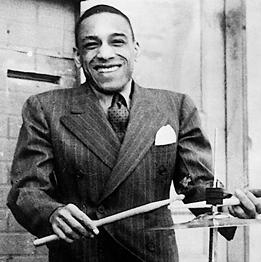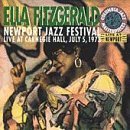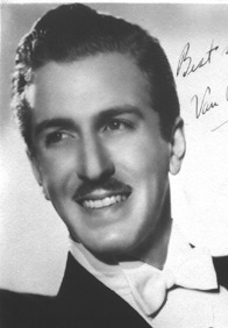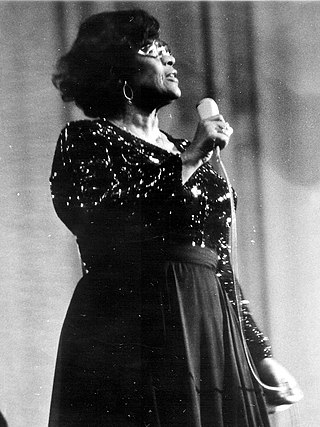Related Research Articles

Ella Jane Fitzgerald was an American jazz singer, sometimes referred to as the "First Lady of Song", "Queen of Jazz", and "Lady Ella". She was noted for her purity of tone, impeccable diction, phrasing, timing, intonation, and a "horn-like" improvisational ability, particularly in her scat singing.

William Henry "Chick" Webb was an American jazz and swing music drummer and band leader.

The Dorsey Brothers were an American studio dance band, led by Tommy and Jimmy Dorsey. They started recording in 1928 for OKeh Records.

Ella at Juan-les-Pins is a 1964 live album by Ella Fitzgerald, accompanied by a quartet led by Roy Eldridge on trumpet with the pianist Tommy Flanagan, Gus Johnson on drums and Bill Yancey on bass. Val Valentin was the recording engineer, cover photo by Jean-Pierre Leloir. The original 1964 album featured 12 songs, highlights of two concerts Fitzgerald performed on the 28 and 29 of July 1964 at the fifth annual Festival Mondial du Jazz Antibes in Juan-les-Pins, France. In 2002 Verve re-issued this album, including all the performances from both evenings. Ella is in fine voice, sounding very aggressive at times, as her voice leaps and growls. The listener also gets to hear Ella improvise a musical tribute to the crickets who are also in fine voice throughout the performance.

Ella Fitzgerald at the Newport Jazz Festival: Live at Carnegie Hall is a 1973 live album by the American jazz singer Ella Fitzgerald, accompanied by a reconstructed Chick Webb Band, the pianist Ellis Larkins, and for the second half of the album, the Tommy Flanagan Quartet.

Between 1935 and 1955, American singer Ella Fitzgerald was signed to Decca Records. Her early recordings as a featured vocalist were frequently uncredited. Her first credited single was 78 RPM recording "I'll Chase the Blues Away" with the Chick Webb Orchestra. Fitzgerald continued recording with Webb until his death in 1939, after which the group was renamed Ella Fitzgerald and Her Famous Orchestra. With the introduction of 10" and 12" Long-Playing records in the late 1940s, Decca released several original albums of Fitzgerald's music and reissued many of her previous single-only releases. From 1935 to the late 1940s Decca issued Ella Fitzgerald's recordings on 78rpm singles and album collections, in book form, of four singles that included eight tracks. These recordings have been re-issued on a series of 15 compact disc by the French record label Classics Records between 1992 and 2008.
"Undecided" is a popular song written by Sid Robin and Charlie Shavers and published in 1938.
"I Want to Be Happy" is a song with music by Vincent Youmans and lyrics by Irving Caesar written for the 1925 musical No, No, Nanette.
"It's Raining, It's Pouring" is an English language nursery rhyme and children's song of American origin. It has a Roud Folk Song Index number of 16814.

"The Nearness of You" is a popular song written in 1937 by Hoagy Carmichael with lyrics by Ned Washington. Intended for an unproduced Paramount film titled Romance In The Rough, the studio's publishing division Famous Music reregistered and published the song in 1940. It was first recorded by Chick Bullock and his Orchestra on Vocalion. Despite numerous accounts to the contrary, the song was never scheduled for and does not appear in the 1938 Paramount film Romance in the Dark.

Alexander Balos Williams was an American jazz trombonist, perhaps best known for playing with the premier big bands of his day, especially the Chick Webb orchestra. Williams also recorded extensively with Ella Fitzgerald.
Charles Francis Kenny was an American composer, lyricist, author, and violinist.

Taft Jordan was an American jazz trumpeter.
Bobby Stark was an American jazz trumpeter.

Van Alexander was an American bandleader, arranger, and composer.
"Organ Grinder's Swing" is a song composed by Will Hudson, with lyrics credited to Mitchell Parish and Irving Mills, published in 1936. It became associated with the Jimmie Lunceford orchestra. Hudson based the "Organ Grinder's Swing" on the nursery rhyme "I Love Coffee, I Love Tea".

Gold is a two-disc compilation album by Ella Fitzgerald that was released on the Verve Records label in 2007. The 40 tracks span Fitzgerald's career from 1938 to 1964.
"F.D.R. Jones" is a 1938 satirical song written by Harold Rome. It was first recorded and released as a single by Ella Fitzgerald in 1938 and was performed by Judy Garland in blackface in the 1941 musical picture Babes on Broadway. The song satirizes the then contemporaneous practice of African American parents who named their children after Franklin D. Roosevelt, the 32nd President of the United States.
"I'm Making Believe" is a 1944 song composed by James V. Monaco with lyrics by Mack Gordon. The song first appeared in the film Sweet and Low-Down; the performance by Benny Goodman and His Orchestra was nominated for the Academy Award for Best Original Song. The version recorded by the Ink Spots and Ella Fitzgerald topped The Billboard's National Best Selling Retail Records chart for two weeks in 1944. Their version had sold over one million copies by the time of Fitzgerald's death in 1996.
References
- ↑ W. E. Studwell and M. Baldin, The big band reader: songs favored by swing era orchestras and other popular ensembles (Haworth Press, 2000), p. 35
- 1 2 Brewster, Paul G. (1976). Children's games and rhymes Volume 1 of Studies in play and games. Ayer Publishing. pp. 82 section C. ISBN 0-405-07914-1 . Retrieved 2010-06-09.
- 1 2 Studwell, William Emmett; Baldin, Mark (2000). The big band reader: songs favored by swing era orchestras and other popular ensembles – Resources in music history. Routledge. p. 35. ISBN 978-0-7890-0914-2.
- ↑ Northall, G. F. English Folk-Rhymes: A collection of traditional verses relating to places and persons, customs, superstitions, etc. 1892. p. 364
- ↑ "Decca 1840 (10-in. double-faced). (Album A-138)". Discography of American Historical Recordings. Retrieved 2023-02-04.
- ↑ "Decca matrix 63693. A-tisket, a-tasket / Chick Webb Orchestra". Discography of American Historical Recordings. Retrieved 2023-02-04.
- ↑ "Decca matrix 64576. I found my yellow basket / Chick Webb Orchestra". Discography of American Historical Recordings. Retrieved 2023-02-04.
- ↑ Songs from the Year 1938 – The World's Music Charts, Tsort.info (retrieved 2010-1-22)
- ↑ "A Bing Crosby Discography - part 1c - Commercial Recordings - Post Decca". Bingmagazine.co.uk. Retrieved 2023-02-04.
- ↑ "Boondox Lyrics - Seven". Genius.com. Retrieved 2017-08-16.
- ↑ Variety (1942). Variety (February 1942). Media History Digital Library Media History Digital Library. New York, NY: Variety Publishing Company.
- ↑ Published in Ali Smith, The First Person and Other Stories (Penguin, 2008)